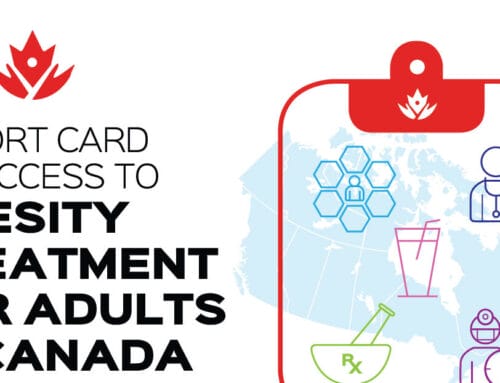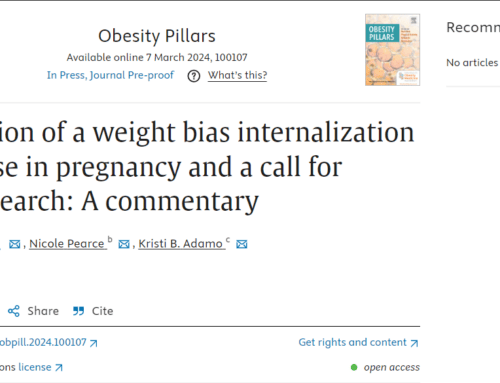From Ximena Ramos-Salas, PhD, Director of Research and Policy at Obesity Canada
Obesity is a stigmatized disease and individuals living with this complex disease face continuous prejudice in healthcare, employment, education, and home settings.
Most of the literature investigating obesity stigma has focused on adults living with obesity. But how does obesity stigma affect children and their families?
In my discussions with my colleague Dr. Andrea Haqq, Professor in the Department of Pediatrics at the University of Alberta, I could see that childhood obesity stigma is an issue that needs more attention. In her clinic, Andrea had observed that children and families affected by childhood obesity face significant prejudice, shaming and blaming in healthcare.
Through Dr. Haqq’s research, I also learned that genetic childhood obesity is often undiagnosed. In some cases, childhood obesity can be associated with early-onset obesity through overeating behavior such as hyperphagia. Hyperphagia is associated with either physical alterations to the hypothalamus (e.g., lesions or tumors) or genetic variants in hypothalamic leptin–melanocortin signaling pathways (e.g., rare genetic diseases of obesity). These rare genetic variants may account for 3%–5% of obesity in children and adults. Hyperphagia contributes to weight gain through impaired satiety and is characterized by a severe preoccupation with food (hyperphagic drive), which can lead to persistent, potentially extreme, or dangerous food-seeking behaviors (night eating, stealing food, and indiscriminate eating)
In children with early-onset severe obesity, the presence of hyperphagia should alert health care providers to refer patients to a geneticist for evaluation of a potential underlying genetic cause of obesity. However, children are not able to get proper diagnosis or care for these genetic conditions, due to the pervasive biased belief that weight is controllable solely though individual behaviours such as healthy eating and exercise. In the healthcare system, the belief that weight is an individual responsibility, strongly influences clinical practice and the decisions that healthcare professionals make to support children living with obesity and their families.
Dr. Haqq shared stories where parents are blamed for their children’s overweight and obesity and even threatened by authorities to have their children removed from their care if they don’t control their child’s eating behaviours. She explained there is a significant lack of knowledge of overeating behaviours and genetic childhood obesity disorders in the health system, which is causing harm to children and families.
In my own research with adults living with obesity, I learned that weight-based bullying and teasing starts at a young age and that this stigmatizing behaviour can come from friends, family members, teachers and health care professionals. These experiences of shaming, blaming, and aggression in childhood can leave deep scars and affect how individuals perceive themselves. This is what we called internalized weight bias – the process by which people who are shamed and blamed for their weight start to believe that the mistreatment they receive is deserved.
Drs. Haqq and Ramos-Salas, and our colleagues Dr. Maryam Kebbe, Dr. Quiming Tang, and Dr. Melania Manco decided to conduct a narrative literature review to identify what is currently known about childhood obesity stigma. This review has now been published and is available through open access in Childhood Obesity. As expected, we found that the lack of understanding of obesity as a complex chronic disease is causing more stigmatization of children and adolescents living with obesity.
We found that children and adolescents living with overweight or obesity are highly vulnerable to weight bias and stigma. Sources of obesity stigma include peers, educators, parents, media and entertainment, and health care providers. Childhood obesity stigma involves bullying, teasing, and adverse health and social outcomes including poor self-esteem, depressive disorders, impaired school performance, and minimal social involvement.
Childhood obesity stigma affects both children and their parents or caregivers. Parents report feelings of isolation, a sense of blame for their child’s weight struggles, and fear regarding their child’s health. Experiencing stigma from health care providers can also affect the health care decisions of parents of children with obesity. Parents who perceive weight stigmatization from their child’s doctor reported seeking a new health care provider and avoiding future appointments.
Based on existing research, experiencing obesity stigma in childhood is harmful and can affect how children feel about themselves and trigger a cascade of psychological, physical, and social issues that have consequences for their health as well as their wellbeing.
Childhood obesity stigma consequences include psychosocial impairment, decreased executive function, reduced health-related quality of life, unhealthy weight control behaviors, and impaired weight management.
One study found that children and adolescents with severe obesity have lower (5 times lower) health-related quality of life than children and adolescents who are healthy and similar quality of life as those diagnosed as having cancer.
Based on our review, we make some recommendations to reduce childhood obesity stigma in healthcare settings:
- Increasing awareness and understanding of the root causes of obesity in children, including overeating behaviors, is essential for reducing stigma and supporting children and their families who are affected by genetic diseases of obesity.
- Health care providers should understand the complexity of obesity as a disease and the challenges facing long-term disease management.
- Health care providers should also avoid oversimplifying the causes of obesity (g., suggesting patients “eat less fast food”).
- Health care providers should avoid using stigmatizing language and practices and strive to make their clinical practices safe and accessible to their patients.
- Change clinician-held beliefs and stereotypes regarding obesity that inform patient interactions.
- Health care providers must have empathy for patients with obesity; they should not blame patients or their parents for their condition and should instead focus on maintaining behavioral and health outcomes
- Recognizing obesity as a disease by health care providers is associated with positive attitudes, no blaming, and empathy toward individuals with obesity.
- Awareness and knowledge of rare genetic diseases of obesity may promote a broad understanding of the complex contributing factors to obesity and reduce weight stigma and facilitate a new scientifically grounded narrative of obesity.
- Genetic testing should be performed in individuals with early-onset severe obesity who have clinical features consistent with a genetic disease of obesity (particularly hyperphagia) and/or who have a family history of severe obesity. Diagnoses of hyperphagia and root causes of childhood obesity by health care providers may ease the impact of stigmatization for parents.
Based on our narrative review, we conclude there is a need for understanding the causes of weight bias in children; identifying negative attitudes, beliefs, and behaviors that are modifiable; developing and testing interventions aimed at reducing weight bias and its effects on children and adolescents with obesity.
Clearly, the findings of our review indicate there is an urgent need to act. We cannot continue to ignore childhood obesity stigma. The health and social well-being of our children is at stake.
Join Obesity Canada in our effort to eliminate weight bias and stigma and help us create a society in which children, adolescents, and adults affected by the disease of obesity are understood, respected, and living healthy lives.






